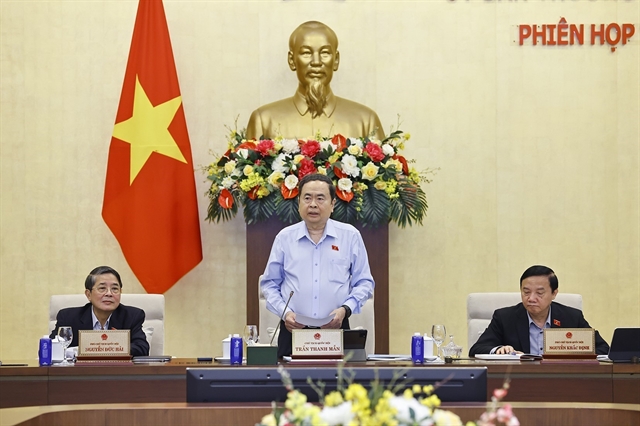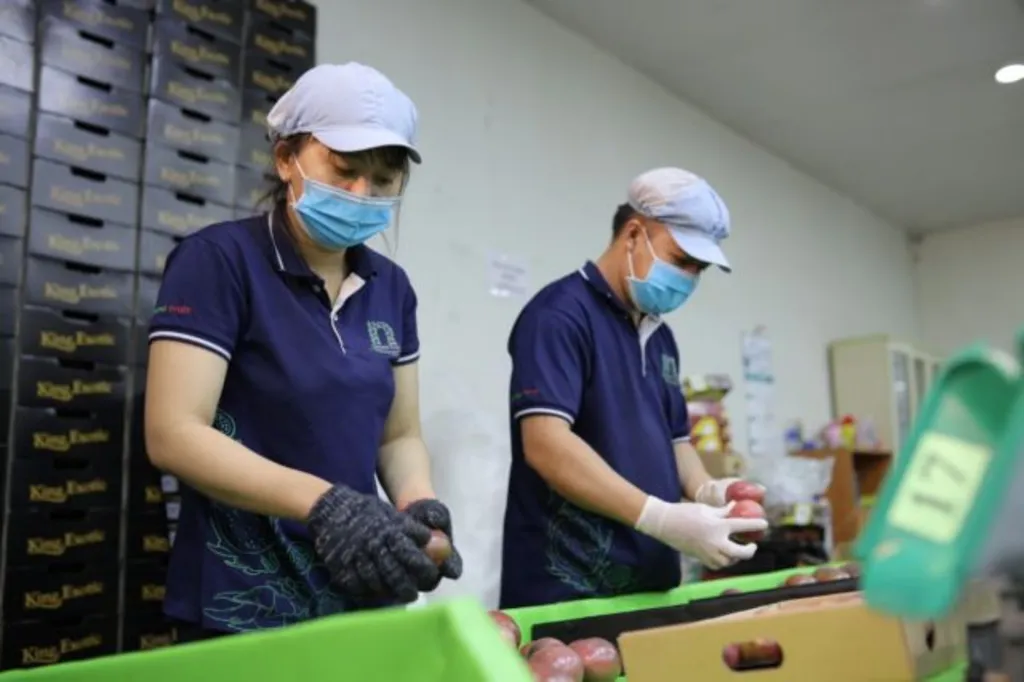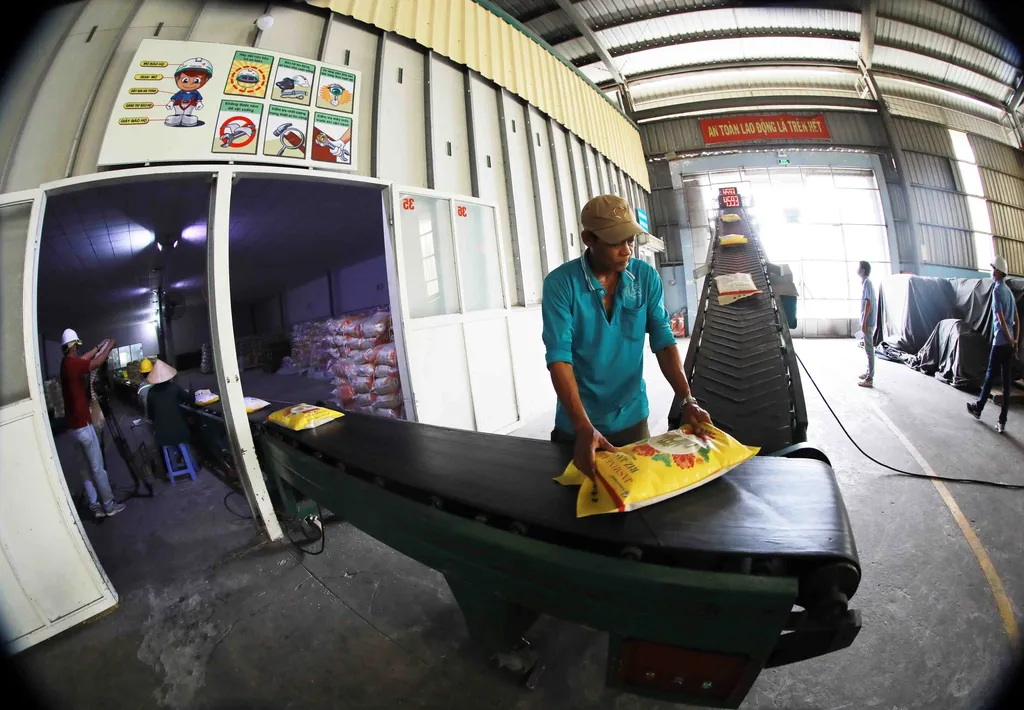 Economy
Economy

 |
| Workers packaging passion fruits for export at a plant of Natural Fruit. VNS Photo |
{ "id": "ILoT5jKED-", "type": "myToolImages", "data": { "data": "" } }
Ly Ly Cao
HÀ NỘI — Benefiting from favourable weather conditions, Việt Nam has a huge advantage in the agricultural segment, and agricultural products also play a key role in exports.
The United Kingdom - Việt Nam Free Trade Agreement (UKVFTA) has taken into effect since the beginning of 2021, and it is expected to boost the country’s exports, especially agricultural products.
In 2021, Vietnamese export to the UK rose 16.4 per cent year-on-year to US$5.7 billion despite the impact of the pandemic, according to the Ministry of Industry and Trade (MoIT).
Among products witnessing dramatic growth in shipments to the UK market, there were three agricultural products - fruits and vegetables (67 per cent), coffee (17 per cent), and pepper (49 per cent).
Data from the General Department of Vietnam Customs showed that in the first six months of 2022, Việt Nam exported more than $2.9 billion to the UK market, an increase of nearly 1.2 per cent year-on-year. Of which agricultural exports climbed nearly 19 per cent over last year.
The UK is the second-largest economy in Europe, with a free trade policy and a great demand for agricultural imports, but it also has strict requirements for imports from other countries. As tariffs are eased, technical barriers are strengthened.
Therefore, Vietnamese enterprises can only use competitive advantages from the agreement if their products meet the quality requirements of British standards and match British consumer tastes.
Đặng Phúc Nguyên, General Secretary of the Vietnam Fruit and Vegetables Association (VinaFruit), said that there are not many enterprises selling products to the UK market, so export turnover was still modest.
“Each month, the export turnover of vegetables and fruits reaches more than $250 million, but shipments to the UK are only $1.5 million,” Nguyên said.
“The UKVFTA helps increase the turnover, which previously was only $1 million per month, but Vietnamese enterprises still encounter technical issues, so it cannot rise strongly.”
Standardisation
To boost shipments, it is necessary to standardise the production process to ensure stable supply in both quantity and quality.
Currently, enterprises have to apply production practice Global GAP to access the UK market.
With experience selling fresh fruits to difficult markets, including the UK, Nguyễn Du, Director of Natural Fruit Trading Service Company Limited, said that it has never been easy to meet all requirements.
“We have to follow standards for pesticides,” said Du. “But sometimes we get a case of cross-contamination, meaning that pesticides used in neighbouring gardens, which do not apply the standards, are blown into our garden due to the wind, so we cannot control it. And that crop cannot be used to export to the UK or any other markets with strict requirements on pesticides and will be discarded.”
"Besides the Global Gap certification for products, you also need several other international certificates from the International Organization for Standardisation and International Labour Organisation to make your products more competitive."
Even though it will take a lot more effort, it does not mean enterprises cannot apply and expand the production methods.
As the country’s big rice exporter, Lộc Trời Group - the first Vietnamese enterprise to export rice to the European market after the EU - Vietnam Free Trade Agreement (EVFTA) came into effect, shared a similar experience.
The UKVFTA and EVFTA are two different agreements, but the quality standards for pesticide residues in products are the same, said Nguyễn Văn Hiếu, Export Director of Lộc Trời Group.
 |
| A worker loading a rice bag on a conveyor belt. VNA/VNS Photo |
{ "id": "JNimezHjZW", "type": "myToolImages", "data": { "data": "" } }
“Lộc Trời has realised these great potential markets since 2020 and has planned to develop production processes for difficult markets, including EU – the UK, the US, and Japan”, Hiếu said.
“We operate in a sustainable value chain from producing and supplying seeds, to crop protection products to farmers, then harvesting, transporting, manufacturing and exporting agricultural products worldwide customers.
“We have field forces with roughly 1,300 agricultural technicians to guide farmers, and organise agricultural large-scale production such as machinery services in planting, harvesting and high-tech services in sowing seeds, spraying pesticides, fertilisers by drones and so on.
“Then we buy back rice from farmers at market price, with a bonus if pesticide residues comply with EU/UK standards.”
The control of pesticide residues is also a top priority from sowing to exporting, Hiếu added.
Building brands for export
Besides a standardised production process, it is also crucial for enterprises to build their brands for their products to increase export volumes and strengthen their positions in the export markets, the general secretary of VinaFruit said.
Currently, Vietnamese vegetables and fruits are mainly on the shelves of small supermarkets in the UK.
In addition, outdated technology in preservation is hindering the country’s vegetable and fruit exports.
“The disadvantage of Vietnamese vegetables and fruit products when exporting fresh is that the preservation technology is not advanced, so they are mainly exported to the UK by plane, with a high price that makes it difficult to sell,” Nguyên said.
“Currently, preservation technology in China is being researched and has some success, such as preserving raw mangoes for a maximum of 40 days. However, it is still shorter than required.
"Our preservation technology is inferior to Thailand and China, so the market share in the UK is still modest.” — VNS




